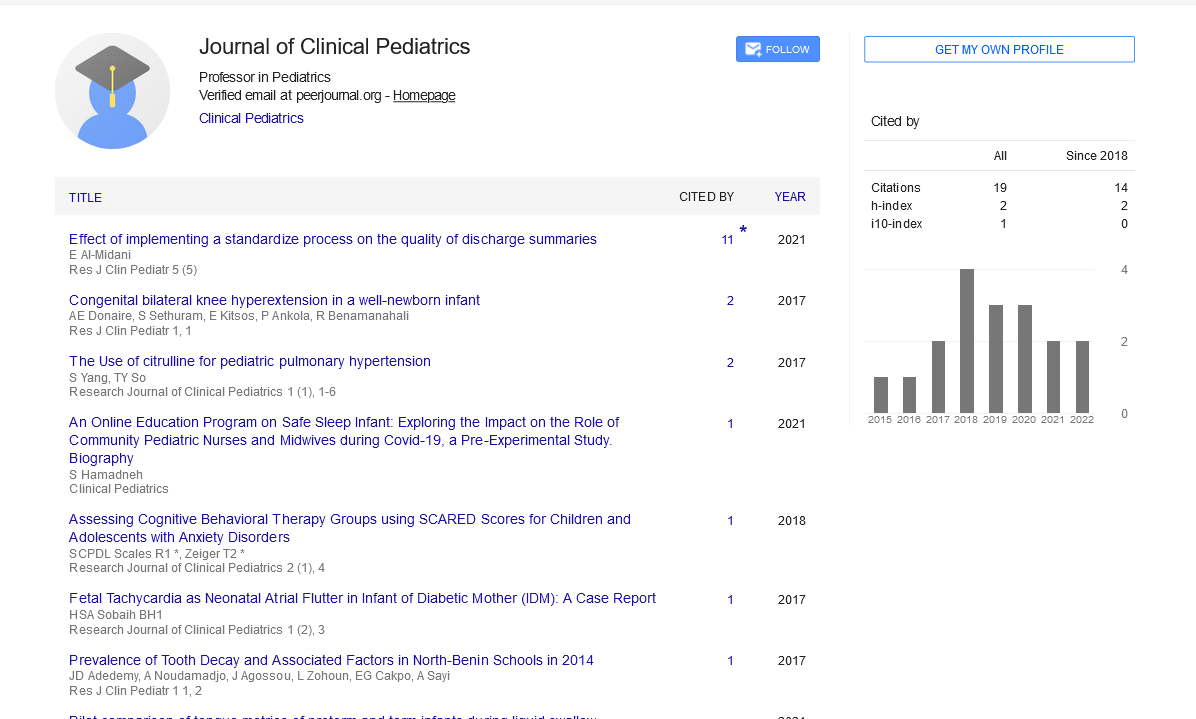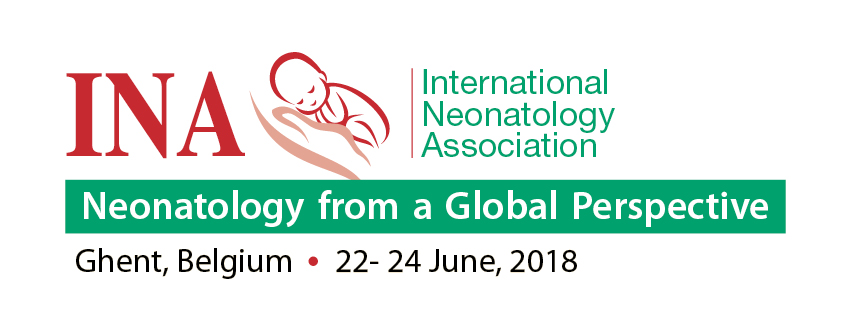Short Communication, Res J Clin Pediatr Vol: 7 Issue: 3
Significance of Pediatric Neurology in Early Diagnosis and Treatment
Robert Calvine*
1Department of Neurology, University of Louisville, Louisville, United States of America
*Corresponding Author: Robert Calvine,
Department of Neurology, University of
Louisville, Louisville, United States of America
E-mail: robert_calvine@ul22.edu
Received date: 23 August, 2023, Manuscript No. RJCP-23-117487;
Editor assigned date: 25 August, 2023, PreQC No. RJCP-23-117487 (PQ);
Reviewed date: 08 September, 2023, QC No. RJCP-23-117487;
Revised date: 15 September, 2023, Manuscript No. RJCP-23-117487 (R);
Published date: 22 September, 2023, DOI: 10.4172/Rjcp.1000153
Citation: Calvine R (2023) Significance of Pediatric Neurology in Early Diagnosis and Treatment. Res J Clin Pediatr 7:3.
Description
The field of pediatric neurology is of immense significance in the realm of pediatric medicine. It plays an essential role in early diagnosis and treatment, addressing neurological disorders that affect children. Pediatric neurology is a specialised branch of medicine that focuses on the diagnosis and management of neurological disorders in children, ranging from infants to adolescents. These disorders encompass a wide spectrum, including epilepsy, developmental delays, movement disorders, neuromuscular conditions, genetic disorders, and more [1].
Understanding the significance of pediatric neurology begins with acknowledging the unique characteristics of the developing brain. In childhood, the brain undergoes rapid growth and maturation. During this period, it is particularly susceptible to the influence of both genetic and environmental factors. Early diagnosis of neurological conditions is essential for several reasons. Many neurological conditions are progressive [2]. Early diagnosis allows for timely intervention to prevent or reduce the progression of the disorder.
In many cases, early treatment can lead to better outcomes, improved quality of life, and increased independence for the child. Early diagnosis can help identify and address secondary complications, such as developmental delays or cognitive impairments that may arise due to the neurological condition [3].
For many children with neurological disorders, early diagnosis and appropriate management significantly enhance their overall quality of life and daily functioning. Pediatric neurologists are trained to recognise the signs and symptoms of neurological conditions in children, which can often be different from those in adults. These symptoms may include seizures, developmental delays, motor impairments, headaches, behavioural changes, and more. The ability to differentiate between normal childhood developmental milestones and signs of an underlying neurological disorder is a vital skill for pediatric neurologists [4,5].
Pediatric neurologists employ a variety of diagnostic tools and tests to investigate and confirm neurological conditions. Magnetic Resonance Imaging (MRI) and Computed Tomography (CT) scans are instrumental in visualising the structure of the brain and identifying abnormalities. Electro-Encephalography (EEG) measures the electrical activity in the brain and is particularly useful in the diagnosis of epilepsy and other seizure disorders. In cases where a genetic component is suspected, genetic testing can pinpoint the specific genetic mutation responsible for the neurological disorder [6,7].
Early intervention and treatment
Once a diagnosis is confirmed, early intervention and treatment plans are essential. These treatment strategies are tailored to the specific condition and the individual child. For conditions like epilepsy, Attention-Deficit or Hyperactivity Disorder (ADHD), or neuromuscular disorders, medications are often an essential component of management. Physical, occupational, speech, and behavioural therapies are frequently employed to address developmental delays and improve motor and cognitive function [8].
In cases of tumours, hydrocephalus, or specific seizure disorders, surgical interventions may be necessary. Lifestyle changes, such as dietary modifications, are sometimes recommended to manage certain neurological conditions. Parents and caregivers play an essential role in the ongoing management and support of children with neurological conditions. Neurological disorders in children can have a profound impact on families. The emotional and financial burdens can be substantial. Early diagnosis and treatment not only benefit the child but also ease the emotional strain on the family and reduce long-term healthcare costs [9,10].
Advancements in pediatric neurology continue to expand the understanding of the developing brain and the ability to diagnose and treat neurological disorders. Emerging technologies, such as genetic therapies and precision medicine approaches, have the great potential for further enhancing the care provided to pediatric patients.
Conclusion
Pediatric neurology is a discipline that carries immense significance in the early diagnosis and treatment of neurological disorders in children. The ability to identify these conditions and initiate interventions in the early stages of a child's life has far-reaching implications, improving not only the child's quality of life but also that of their family. With continued studies, innovation, and a commitment to early diagnosis and treatment, pediatric neurology will continue to play a pivotal role in ensuring brighter futures for children living with neurological conditions.
References
- Duncan P, Dixon RR, Carlson J (2003) Childhood and adolescent sexuality. Pediatr Clin North Am 50: 765-80.
- Biro FM, Dorn LD (2005) Puberty and adolescent sexuality. Pediatr Ann 34: 777-784.
- Kaestle CE, Allen KR, Wesche R, Grafsky EL (2021) Adolescent Sexual Development: A Family Perspective. J Sex Res 58: 874-890.
- Hoult TF (1984) Human sexuality in biological perspective: Theoretical and methodological considerations. J Homosex 9: 137-155.
- Ross MW, Rogers LJ, McCulloch H (1978) Stigma, sex and society: A new look at gender differentiation and sexual variation. J Homosex 3: 315-30.
- Graaf HD, Rademakers J (2011) The psychological measurement of childhood sexual development in Western societies: Methodological challenges. J Sex Res 48: 118-129.
- Cacciatore RS, Ingman-Friberg SM, Lainiala LP, Apter DL (2020) Verbal and behavioral expressions of child sexuality among 1-6-Year-olds as Observed by Daycare Professionals in Finland. Arch Sex Behav 49: 2725-2734.
- Sandnabba NK, Santtila P, Wannas M, Krook K (2003) Age and gender specific sexual behaviors in children. Child Abuse Negl 27: 579-605.
- Hornor G (2004) Sexual behavior in children: Normal or not? J Pediatr Health Care 18: 57-64.
- Friedrich WN, Grambsch P, Broughton D, Kuiper J, Beilke RL (1991) Normative sexual behavior in children. Pediatrics 88: 456-464.
 Spanish
Spanish  Chinese
Chinese  Russian
Russian  German
German  French
French  Japanese
Japanese  Portuguese
Portuguese  Hindi
Hindi 
